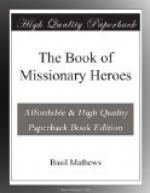Quickly she told her story of how the strange white man in the great canoe that smoked had found her in the village of their enemies, had saved her from slavery, and—now, had brought her safely home again. The story passed from lip to lip. Every spear and bow and arrow was dropped.
The girls were quickly put ashore, and as Grenfell walked up the village street every warrior who had but a few moments before been seeking his blood was now gazing at this strange friend who had brought back to the tribe the daughters whom they thought they had lost for ever.
Grenfell went on with his work in face of fever, inter-tribal fighting, slave-raiders, the horrors of wife and slave-slaughter at funerals, witch-killing—and in some ways worse still, the horrible cruelties of the Belgian rubber-traders—for over a quarter of a century.
In June 1906, accompanied by his
negro companions, he lay at
Yalemba, sick with fever. Two of the Africans
wrote a letter for
help to other missionaries:
“We are very sorrow,” they wrote, “because out Master is very sick. So now we beging you one of you let him come to help Mr Grenfell please. We think now is near to die, but we don’t know how to do with him. Yours,
DISASI
MAKULO,
MASCOO
LUVUSU.”
To-day all up the fifteen hundred miles of Congo waterway the power of the work done by Grenfell and the men who came with him and after him has changed all the life. Gone are the slave-raiders, the inter-tribal wars, the cruelties of the white men, along that line. There stand instead negroes who cap make bricks, build houses, turn a lathe; engineers, printers, bookbinders, blacksmiths, carpenters, worshipping in churches built with their own hands. But beyond, and among the myriad tributaries and the vast forests millions of men have never yet even heard of the love of God in Jesus Christ, and still work their hideous cruelties.
So Grenfell, like Livingstone, opened a door. It stands open.
CHAPTER XVIII
“A MAN WHO CAN TURN HIS HAND TO ANYTHING”
Alexander Mackay
(Dates 1863-1876)
The inquisitive village folk stared over their garden gates at Mr. Mackay, the minister of the Free Kirk of Rhynie, a small Aberdeenshire village, as he stood with his thirteen-year-old boy gazing into the road at their feet. The father was apparently scratching at the stones and dust with his stick. The villagers shook their heads.
“Fat’s the minister glowerin’ at, wi’ his loon Alic, among the stoor o’ the turnpike?"[49] asked the villagers of one another.
The minister certainly was powerful in the pulpit, but his ways were more than they could understand. He was for ever hammering at the rocks on the moor and lugging ugly lumps of useless stone homeward, containing “fossils” as he called them.




